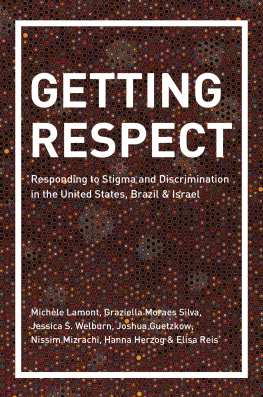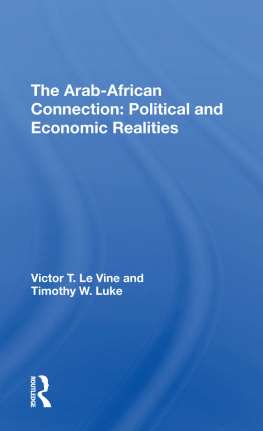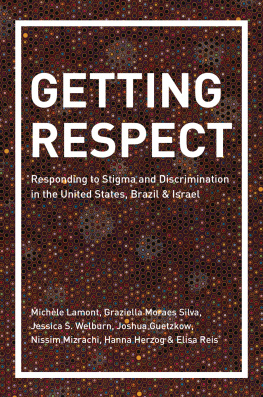
GETTING RESPECT
GETTING RESPECT
Responding to Stigma and Discrimination in the United States, Brazil, and Israel
Michle Lamont, Graziella Moraes Silva, Jessica S. Welburn, Joshua Guetzkow, Nissim Mizrachi, Hanna Herzog, and Elisa Reis
PRINCETON UNIVERSITY PRESS
Princeton and Oxford
Copyright 2016 by Princeton University Press
Published by Princeton University Press, 41 William Street,
Princeton, New Jersey 08540
In the United Kingdom: Princeton University Press, 6 Oxford
Street, Woodstock, Oxfordshire OX20 1TR
press.princeton.edu
Jacket art: Bharti Kher, A Love letter, 2009.
Bindis on painted board. 188 249 7 cm. / 74 98 2 in.
Courtesy of the artist and Hauser & Wirth.
Bharti Kher
All Rights Reserved
ISBN 978-0-691-16707-7
Library of Congress Control Number: 2016935762
British Library Cataloging-in-Publication Data is available
This book has been composed in
Sabon Next LT Pro & Univers LT Std
Printed on acid-free paper
Printed in the United States of America
1 3 5 7 9 10 8 6 4 2
CONTENTS
LIST OF TABLES
PREFACE AND ACKNOWLEDGMENTS
This is a conjointly written booknot an edited volume. It is the result of a rewarding and demanding collective adventure. It required collaboration across three continents separated by several time zones over a number of years. Regular discussion of all the usual aspects of data collection, analysis, and writing was essential to ensure consistency in approach and methods and to develop in dialogue the comparative analysis that anchors our contribution. For this purpose, the seven authors (joined periodically by other collaborators) held regular Skype meetings, at times weekly, at other times monthly. We also met face-to-face at least once a year for a few days in Rio de Janeiro; Tel Aviv; or Cambridge, Massachusetts; or at conferences and workshops elsewhere. We debated, argued, disagreed, and mostly learned from one another. We believe that our book demonstrates the value of collaborationwhen complementary perspectives shed light on realities that could not be illumined adequately by a single mind.
The pace of our work accommodated our other writing commitments as well as the demands of our respective professional trajectories, which ranged from completing dissertations and finding academic positions or postdoctoral fellowships to coming up for tenure and chairing a department or a research center. The major milestones of human life (from having babies to becoming a grandparent) also intervened. We became significant others amidst the chaos, challenges, and multiple demands we faced.
The idea for the project germinated in 2005 in a paper written by Michle Lamont and Christopher Bail on group boundaries in Brazil, Israel, Northern Ireland, and Qubec, with the cases of France and the United States in the background (Lamont and Bail 2005). The idea was to compare equalization strategies in countries where group boundaries are strongly policed (Israel and Northern Ireland) and where they are more permeable (Brazil and Qubec). This led to a workshop titled Ethnoracism and the After the meeting, several of us agreed on the value of comparing the cases of Brazil, Israel, and the United States, guided by a combination of theoretical and practical reasons (described in the Introduction).
The following year was dedicated to defining the project further and seeking funding to cover several years of collaboration. The research in the New York metropolitan area was supported by a grant from the National Science Foundation (African-Americans Respond to Racism and Discrimination; grant 0701542). The US-Brazil comparison was made possible by a grant from the Weatherhead Center for International Affairs (Bridging Boundaries: Destigmatization Strategies of African-Americans and Black Brazilians). In Israel, research was supported by a grant from the United StatesIsrael Binational Science Foundation (Destigmatization Strategies among Ethnic Groups in Israel) and from the Van Leer Jerusalem Institute (Crossing Boundaries: Processes of Destigmatization among Palestinans and Mizrahi Jews in Israel). A Weatherhead Initiative grant from the Weatherhead Center for International Studies (A Comparative Study of Responses to Discrimination by Members of Stigmatized Groups) supported most of our meetings and other costs associated with the collaboration. Finally, each team benefited from additional sources of funding. The Israeli team received funds from the Department of Sociology and Anthropology at Tel Aviv University, and the Brazil team received funds from National Council for Scientific and Technological Development (CNPq), the Rio de Janeiro State Agency for Research Support (FAPERJ), and the Coordination for the Improvement of Higher Education Personnel (CAPES).
The bulk of the data collection was conducted in 2007 and 2008, with slight variations across sites. Coding started in 2009 and continued intermittently until 2012, with additional work on specific issues being conducted as we wrote. The bulk of the writing was completed in 20122015.
The core of the US team was composed of Michle Lamont, Crystal Fleming, and Jessica S. Welburn. Crystal remained part of the team until we started drafting the book in the fall of 2012. She then chose to move on to write her own book on slavery in French collective memory. Her input on a number of conceptual issues and in the creation of the interview schedule and the coding key was crucial and is gratefully acknowledged.
Most of the US interviews were conducted in northern New Jersey by Crystal and Jessica, together with Cassi Pitman (with a few interviews conducted by Michael Jeffries). The coding team, supervised in turn by Crystal Fleming, Jessica S. Welburn, and Anthony Jacks, also included Monica Bell, Moa Bursell, Jeffrey Denis, Nicole Hirsch, and Cassi Pittman. Sabrina Pendergrass, Matthew Clair, and Monica Bell helped with the review of the literature, while Steven Brown, Nathan Fosse, and Charlotte Lloyd provided technical assistance with the quantitative data analysis. Christy Ley assisted with the preparation of the final manuscript. Several Harvard undergraduates were involved in various phases of the project: Melissa Bellin, David Clifton, Nafisa Eltahir, Veronique Irwin, Christina Nguyen, and Natalie Smith. Travis Clough, Joe Cook, Kristen Halbert, Kathleen Hoover, Heather Latham, and Hunter Taylor offered excellent staff and administrative support at various times.
While most of the American graduate research assistants involved were not part of the core writing team, they had access to the data, and several published their first publications based on it. Their papers came out in two special issues of journals that were connected to the project: Responses to Discrimination and Racism by Members of Stigmatized Groups: Brazil, Canada, France, Israel, South Africa, Sweden, and the United States, Ethnic and Racial Studies (February 2012), co-edited by Michle Lamont and Nissim Mizrachi, and Varieties of Responses to Stigmatization: Macro, Meso, and Micro Dimensions, Du Bois Review 9:41200 (2012) co-edited by Michle Lamont, Jessica S. Welburn, and Crystal M. Fleming.
The core of the Brazilian team was Graziella Moraes Silva and Elisa Reis, who published several papers based on the data from the project. Interviews were conducted by Suzana Mattos, Jonas Henrique de Oliveira, Carla Ramos, Marcio Andr Santos, Graziella Moraes Silva, Guilherme Nogueira de Souza, and Simone Souza. Most interviewers also participated in coding, but other researchers from the Network for the Study of Inequality (NIED) also contributed in later stages of the project and relied on the interviews to write their own papers, namely, Luciana Souza Leo, who published with Graziella Moraes Silva a paper on the identity of pardos in Brazil (O Paradoxo da Mistura: Identidades, desigualdades e percepo de discriminao entre brasileiros pardos,
Next page









